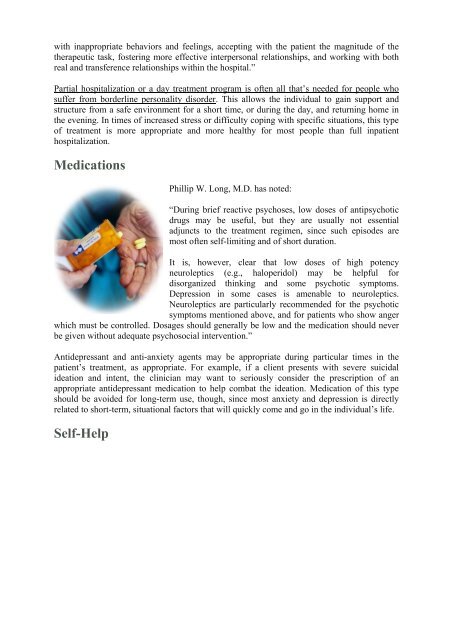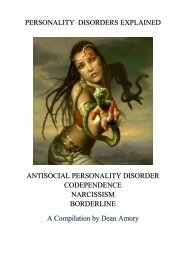Borderline - DEAN AMORY
Create successful ePaper yourself
Turn your PDF publications into a flip-book with our unique Google optimized e-Paper software.
with inappropriate behaviors and feelings, accepting with the patient the magnitude of the<br />
therapeutic task, fostering more effective interpersonal relationships, and working with both<br />
real and transference relationships within the hospital.”<br />
Partial hospitalization or a day treatment program is often all that’s needed for people who<br />
suffer from borderline personality disorder. This allows the individual to gain support and<br />
structure from a safe environment for a short time, or during the day, and returning home in<br />
the evening. In times of increased stress or difficulty coping with specific situations, this type<br />
of treatment is more appropriate and more healthy for most people than full inpatient<br />
hospitalization.<br />
Medications<br />
Phillip W. Long, M.D. has noted:<br />
“During brief reactive psychoses, low doses of antipsychotic<br />
drugs may be useful, but they are usually not essential<br />
adjuncts to the treatment regimen, since such episodes are<br />
most often self-limiting and of short duration.<br />
It is, however, clear that low doses of high potency<br />
neuroleptics (e.g., haloperidol) may be helpful for<br />
disorganized thinking and some psychotic symptoms.<br />
Depression in some cases is amenable to neuroleptics.<br />
Neuroleptics are particularly recommended for the psychotic<br />
symptoms mentioned above, and for patients who show anger<br />
which must be controlled. Dosages should generally be low and the medication should never<br />
be given without adequate psychosocial intervention.”<br />
Antidepressant and anti-anxiety agents may be appropriate during particular times in the<br />
patient’s treatment, as appropriate. For example, if a client presents with severe suicidal<br />
ideation and intent, the clinician may want to seriously consider the prescription of an<br />
appropriate antidepressant medication to help combat the ideation. Medication of this type<br />
should be avoided for long-term use, though, since most anxiety and depression is directly<br />
related to short-term, situational factors that will quickly come and go in the individual’s life.<br />
Self-Help


















